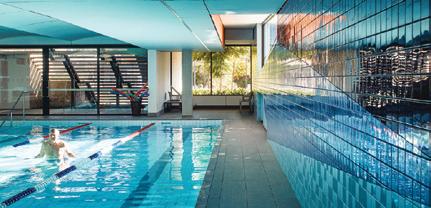
8 minute read
Life in a village
Living in a retirement village can offer a supportive environment and encourage independence, as well as the ability to enjoy social and leisure activities, if you choose.
Most retirement villages have a great sense of community and you can expect to be surrounded generally by like-minded, friendly and welcoming neighbours.
Culture
Each village has its own culture, but generally each village should be based on ‘senior friendly’ criteria and a community focused environment.
While each village differs from another, residents usually have an active say in which activities will take place, and are often involved in running events at the village. Depending on the village, some of these activities may include aerobics, water/aqua aerobics, card afternoons, Probus, personal training, knitting and sewing circles, craft groups plus outings to galleries, movies, events and places of interest. Regular ‘Happy Hours’ and afternoons spent watching televised sport are also popular among some residents.
Amenities
Retirement villages are run by professional managers and support staff who are committed to making life easier for residents, whether it is arranging for the collection of dry cleaning or keeping the garden in top condition.
Security and 24 hour call systems, communal facilities such as games rooms or dining areas, or medical and allied health services are some of the amenities available to residents.
Before moving to a residential village, enquire about the services and amenities available.
Settling into village life
Judy and her partner, Bill, were in their 60s when they moved to SwanCare retirement community and instantly got involved in village life. They volunteered, as many residents do, in various roles around the community, including transporting residents around the site in a buggy. Judy enjoys sewing and as a member of a patchwork club, speaks about the importance of keeping hobbies. “It’s important to keep outside interests as long as possible. But also, there are so many opportunities here for those that want to participate. That’s a benefit of being in a bigger retirement village, we have more services and facilities,” says Judy. As well as keeping up with her hobbies, Judy also volunteers as a member of the village residents committee. “We meet with residents over morning tea and they discuss any issues or problems that have arisen. Then we meet with the Executive team to relay information and provide feedback,” explains Judy. With the Executive Team on-site, all residents have the ability to contact and interact with all managers and staff, making for a great environment. Staff regularly participate in activities with residents including line dancing. Judy says, “They have an excellent structure here, an open-door policy where you can get access to management on all levels. Plus, management is all on-site which is advantageous as it means we can communicate more effectively. “It’s why I’m part of the council, so I can get involved in the running of the village and help improve life for residents.” SwanCare has a handy ‘What’s On’ guide published every month to help residents plan their activities. Judy likes to keep herself busy, filling her day with her many hobbies and commitments. “There are at least thirty clubs here (when not in COVID times). You can join anything and everything!” she says.
At your service
Indulge in catered dining at the village’s restaurant or bistro, catch up with neighbours in the coffee lounge or enjoy a barbecue with your family, or perhaps you might simply prefer a quiet dinner in your own unit. These are the options available at most villages.
Sharing is caring
Communal facilities are common features in retirement villages, with a range of services and amenities available to residents.

There are recreational, service and social communal facilities which, depending on the village, may include: ◆ Libraries and community centres ◆ Barbecue areas, restaurants or internet cafés
◆ Gaming areas such as billiards, table tennis,indoor bowls, bowling greens and swimming pools ◆ Medical services such as doctors, podiatrists and physiotherapists ◆ Other services such as banking and hairdressers
Be sure to visit and check the communal facilities available in the village you choose to ensure it fits with your lifestyle and needs.
Health
Looking after your health is important. Some retirement villages are equipped to help you manage any existing health problems and may also be prepared to assist should you become unwell during your stay. Some villages have call systems installed in their villas and apartments to provide a 24 hour monitoring service for medical emergencies. Staff trained in first aid may also attend to the emergency.
Some villages may also keep a confidential record of residents’ medical history on file.
This information may include your next of kin and Medicare details, which is released only with your authorisation to medical services in
an emergency.
Security and 24 hour call
A safe haven we can call ‘home’ is important but, without security, a comfortable lifestyle can be difficult to maintain.
Retirement villages can offer a safe environment. Most villages have 24 hour on-call assistance


Ask about our flexible pricing options - we can help!
Retirement. Reimagined.
With SwanCare Bentley Park’s new $20m Leisure Precinct, the future of retirement living is here.
Complementing these world-class amenities is a full-service community offering to-your-door laundry, home care, groceries and freshly cooked meals as well as 24-hour resident support and security. There’s also four fullyaccredited residential aged care facilities on-site for future needs.
Winner
WA Architecture Awards 2020 Urban Design Award
Take a virtual tour at swancare.com.au/explore
Ph: (08) 6250 0016 retire@swancare.com.au
Non-profit & West Australian since 1961
Most villages have a great sense of community, where you’ll be surrounded by like-minded and friendly neighbours.
and security and, at the press of a button, help is available 24 hours a day, seven days a week whenever required.
You can be instantly connected to a friendly and qualified staff member or call assistant who will organise the assistance you need, which may mean calling a family member, friend, neighbour or an emergency response service such as ambulance or police. Residents can also choose the option of a daily welfare call.
Security is central to safe and comfortable living in everyday life, just as it is in community villages. Living in an environment where neighbours will look out for you and where dedicated staff are available to assist, will also give your family and friends peace of mind in knowing you are safe and well.
Are guests allowed?
Family and friends are an integral part of life, and sometimes it’s enjoyable to have them stay with you as guests at a retirement village.
Each village is different, but generally, visitors are welcome to stay and may also use the communal facilities as your guest.
What about pets?
They love us unconditionally and have been known to boost a person’s health and happiness. While our family and friends are important to us, for some, pets also hold a special place in our lives.
Whether you are allowed to bring your pet with you when you move to a retirement village will depend on the characteristics of your pet and the pet policy and rules of the village.

The size, temperament and audibility of the particular pet will also be relevant when a village decides whether it is appropriate to welcome your pet into the residential community.
You will have the best chance of bringing your pet with you if the village is large and open, the homes are well spaced and your pet is small, quiet, friendly and clean.
If bringing your pet with you is essential, then learning about the village pet policy and rules should be one of the first enquiries you make before considering a retirement community.
Resident Committees
To promote and protect the interests of residents, Resident Committees are an integral group at retirement villages.
Committee members are elected by other residents to hold office for a term of one year, however residents can stand for re-election after their term passes.
While participation is optional, Resident Committees offer residents the opportunity to make a contribution to the village and the chance to interact in a supportive way with other residents.
The basic structure and functions of a Residents’ Committee are described below:
◆ A Residents’ Committee can determine its own procedures and appoint sub-committees. ◆ The administering authority does not need to be involved in the conduct of the Committee, but can meet with the group to ensure reasonable consultation on significant village issues. ◆ It is an offence for an administering authority to deliberately discourage or prevent residents from forming a Residents’ Committee or to obstruct a Committee in the performance of its functions. ◆ A member can be removed from office by a special resolution of residents if the need arises.

Finance committees
While financial planning can be vital before entering a retirement village, it is equally important to look after your finances during your stay.
The administering authority is required to undertake reasonable consultation with a Residents’ Committee on a number of issues, including the preparation of an annual budget for the village. Finance sub-committees are made up of residents who have knowledge or are interested in accounting practices.
However, it is a procedure which may vary from village to village, depending on its size and the needs of residents and administering authorities.
Retirement Village Associations
Residents can choose to join their State or Territory retirement village association which represents retirees living in retirement communities.
These members-only retirement village associations usually assist in Government and Industry policy changes and how they will impact their members. They also provide information or advice, can mediate conflict resolutions with you and your retirement village, and more.
Australia’s peak body for the residential village industry is the Retirement Living Council. It works closely with state associations, particularly in relation to legislative matters.
The Retirement Living Council advocates for the industry with Government while also encouraging high-quality village living.










